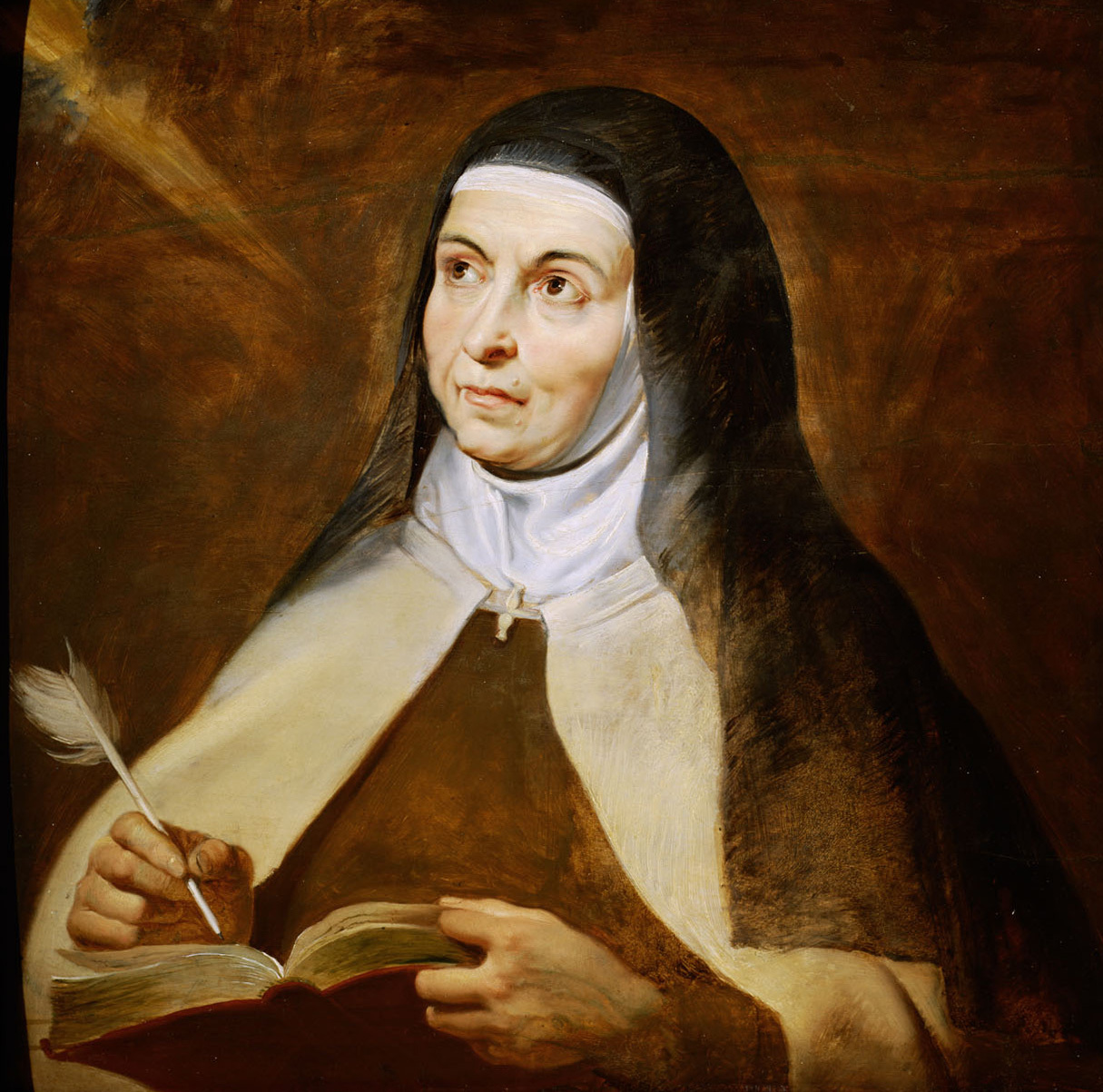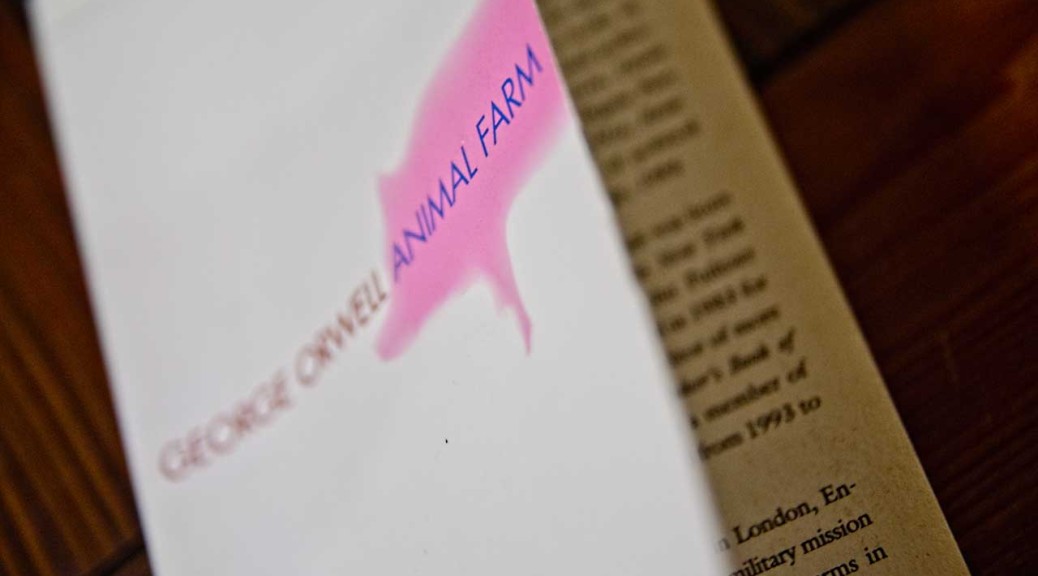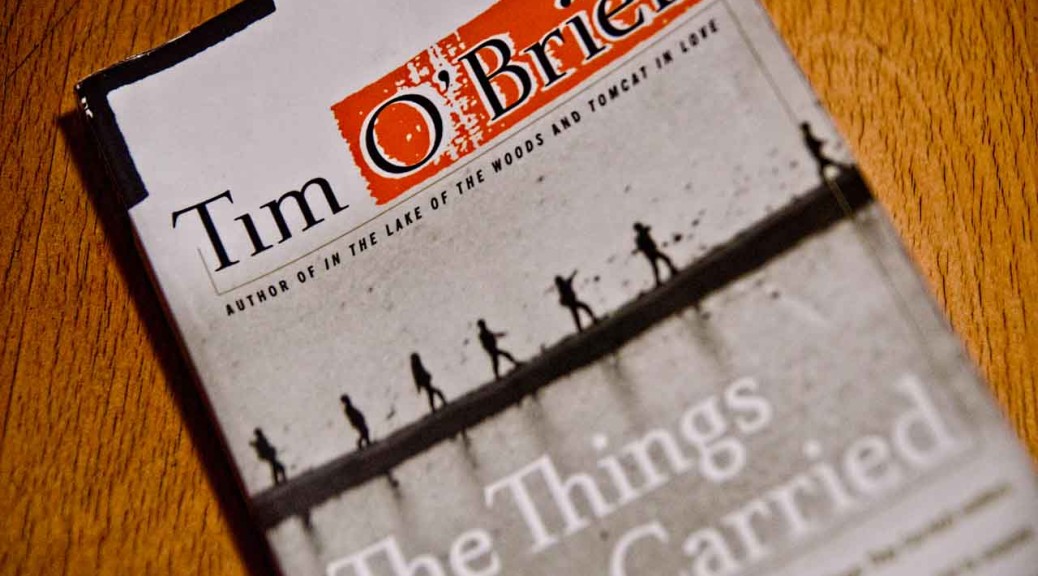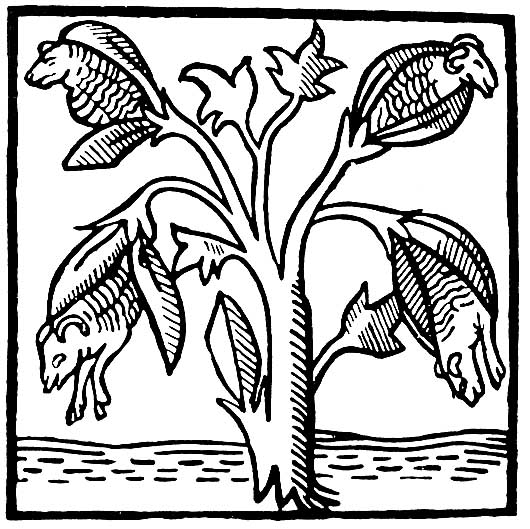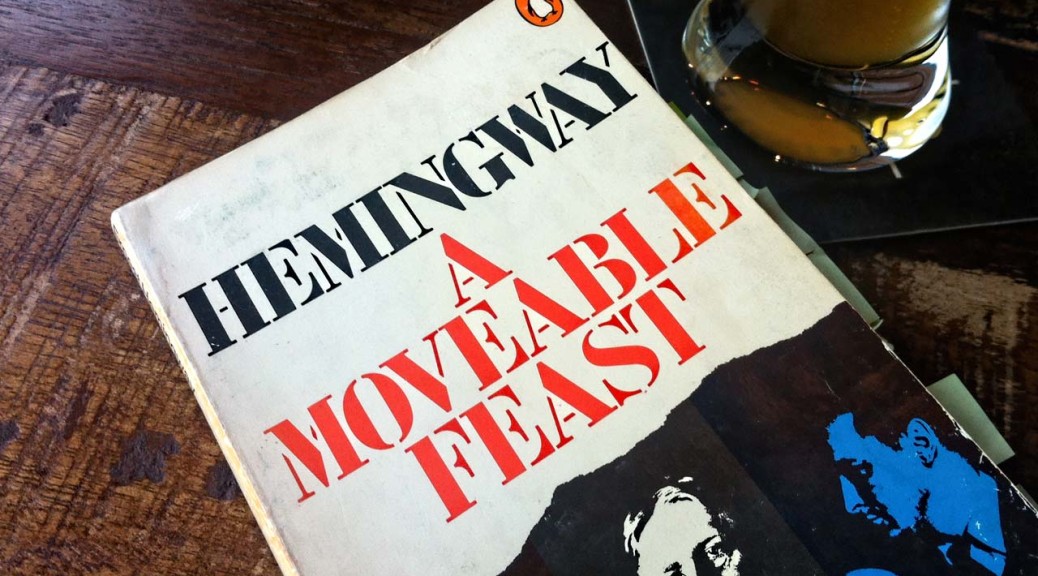Hemingway, Ernest. A Moveable Feast. Middlesex, England: Penguin Books, 1973.
“If the reader prefers, this book may be regarded as fiction. But there is always the chance that such a book of fiction may throw some light on what has been written as fact. ” p. 8
“I was writing about up in Michigan and since it was a wild, cold, blowing day it was that sort of day in the story. I had already seen the end of fall come through boyhood, youth and young manhood, and in one place you could write about it better than in another.” p. 11
“I’ve seen you, beauty, and you belong to me now, whoever you are waiting for and if I never see you again, I thought. You belong to me and all Paris belongs to me and I belong to this notebook and this pencil.
“Then I went back to writing and I entered far into the story and was lost in it. I was writing it now and it was not writing itself and I did not look up nor know anything about the time nor think where I was nor order any more rum St James.” p. 12
“After writing a story I was always empty and both sad and happy, as though I had made love, and I was sure this was a very good story although I would not know truly how good until I read it over the next day.” p. 12
“Maybe away from Paris I could write about Paris as in Paris I could write about Michigan.” p. 13
“It was wonderful to walk down the long flights of stairs knowing that I’d had good luck working. I always worked until I had something done and I always stopped when I knew what was going to happen next.” p. 15.
****”I would stand and look out over the roofs of Paris and think. ‘Do not worry. You have always written before and you will write now. All you have to do is to write one true sentence. Write the truest sentence you know.’So finally I would write one true sentence, and then go on from there. It was easy then because there was always one true sentence that I knew or had seen or had heard someone say. If I started to write elaborately, or like someone introducing or presenting something, I found that I could cut that scroll-work or ornament out and throw it away and start with the first true simple declarative sentence I had written. Up in that room I decided that I would write one story about each thing that I knew about. I was trying to do this all the time I was writing, and it was good and severe discipline.
I was in that room too that I learned not to think about anything that I was writing from the time I stopped writing until I started the next day. That was my subconscious would be working on it and at the same time I would be listening to other people and noticing everything, I hope; learning, I hoped; and I would read so that I would not think about my work and make myself impotent to do it.” p. 15
Miss Stein “told me that I was not a good enough writer to be published there or in the Saturday Evening Pot but that I might be some new sort of writer in my own way, but the first thing to remember was not to write stories that were inaccrochable.” p. 18
“Work could cure almost anything, I believed then, and I believe now.” p. 23.
“When I was writing, it was necessary to get exercise, to be tired in the body, and it was very good to make love with whom you loved. That was better than anything. But afterwards, when you were empty, it was necessary to read in order not to think or worry about your work until you could do it again. I had learned already never to empty the well of my writing, but always to stop when there was still something there in the deep part of the well, and let it refill at night from the springs that fed it.” p. 24-25.
D.H. Lawrence The Prussian Officer
Marie Belloc Lownder The Lodger
“If you brought up Joyce twice, you would not be invited back. It was like mentioning one general favourably to another general.” p. 26.
“‘The boy’s patron was probably drunk by eleven o’clock in the morning,’ I said. ‘That’s why he makes such lovely phrases.'” p. 28
“Then I was getting up to the Closerie de Lilas with the light on my old friend, the statue of Marshal Ney with his sword out and shadows of the trees on the bronze, and he alone there and behind what a fiasco he’d made of Waterloo, I thought that all generations were lost by something and always had been and always would be, and I stopped at the Lilas to keep the statue company and drank a cold beer before going home to the flat over the sawmill.” p. 29
“But the hell with her lost-generation talk and all the dirty, easy labels.” p. 29.
F. Puss
“Constance Garnett edition of War and Peace, and The Gambler and Other Stories by Dostoyevsky.” p. 31.
“‘How do you tell a valuable French book?’
“First there are the pictures. Then it is a question of the quality of the pictures. Then it is the binding. If a book is good, the owner will have it bound properly. All books in English are bound, but bound badly. There is no way of judging them.” p. 35.
“there was very good fishing in Paris itself. I did not fish because I did not have the tackle and I preferred to save my money to fish in Spain.” p. 37.
With the fishermen and the life on the river, the beautiful barges with their own life on board, the tugs with their smoke-stacks that folded back to pass under the bridges, pulling a tow of barges, the great elms on the stone banks of the river, the plane trees and in some places the poplars, I could never be lonely along the river.” p. 37.
“When spring came, even the false spring, there were no problems except where to be happiest. The only thing that could spoil the day was people and if you could keep from making engagements, each day had no limits. People were always the limiters of happiness except for the very few that were as good as spring itself.” p. 39.
“The one who is doing his work and getting satisfaction from it is not the one the poverty bothers.” p. 40.
“We ate well and cheaply and drank well and cheaply and slept well and warm together and loved each other.” p. 41
“‘Yes, Tatie, and you and Chink always talking about how to make things true, writing them, and put them rightly and not describe. I remember everything. Sometimes he was right and sometimes you were right. I remember the lights and textures and the shapes you argued about.'” p. 44.
“But Paris was a very old city and we were young and nothing was simple there, not even poverty, nor sudden money, nor the moonlight, nor right and wrong, nor the breathing of someone who lay beside you in the moonlight.” p. 47.
“When I stopped working on the races I was glad, but it left an emptiness. By then I knew that everything good and bad left an emptiness when it stopped. But if it was bad, the emptiness filled up by itself. If it was good you could only fill it by finding something better.” p. 49.
“There you could always go into the Luxenbourg Museum and all the paintings were sharpened and clearer and more beautiful if you were belly-empty, hollow-hungry. I learned to understand Cézanne much better and to see truly how he made landscapes when I was hungry. I used to wonder if he were hungry too when he painted; but I thought possibly it was only tat he had forgotten to eat.” p. 53.
“You God-damn complainer. You dirty phony saint and martyr, I said to myself. You quit journalism of your own accord. You have credit and Sylvia would have loaned you money. She has, plenty of times. Sure. And then the next thing you would be compromising on something else. Hunger is healthy and the pictures do look better when you are hungry. Eating is wonderful too and did you know where you are going to eat night now?” p. 56.
“It was one of two stories I had left when everything I had written was stolen in Hadley’s suitcase that time at the Gare de Lyon when she was bringing the manuscripts down to me to Lausanne as a surprise, so I could work on them on our holidays in the mountains. She had put in the originals, the typescripts and the carbons, all in manila folders.” p. 57.
“It was probably good for me to lose early work and I told him all that stuff you feed the troops. I was going to start writing stories again I said and, as I said it, only trying to lie so that he would not feel so bad, I knew that it was true.” p. 58.
“It was a very simple story called Out of Season and I had omitted the real end of it which was that the old man hanged himself. This was omitted on my new theory that you could omit anything if you knew that you omitted, and the omitted part would strengthen thte story and make people feel something more than they understood.” p. 58
“I knew I must write a novel. But it seemed an impossible thing to do when I had been trying with great difficulty to write paragraphs that would be the distillation of what made a novel. It was necessary to write longer stories now as you would train for a longer race.” p. 59
“I knew it was probably a good thing that it was lost, but I knew too that I must write a novel. I would put it off, though, until I could not help doing it. I was damned if I would write on because it was what I should do if we were to eat regularly. When I had to write it, then it would be the only thing to do and there would be no choice. Let the pressure build. In the meantime I would write a long story about whatever I knew best.” p. 59
“He was a good companion until he drank too much and, at that time, when he was lying, he was more interesting than many men telling a story truly.” p. 61
“The blue-backed notebooks, the two pencils and the pencil-sharpener (a pocket-knife was too wasteful), the marble-topped tables, the smell of early morning, sweeping out and mopping and luck were all you needed.” p. 69.
“‘I thought you could help me, Hem.’
‘I’d be glad to shoot you.’
‘Would you?’
‘No. There’s a law against it.'” p. 71
“So the next morning I woke early, boiled the rubber nipples and the bottles, made the formula, finished the bottling, gave Mr Bumby a bottle and worked on the dining-room table before anyone but he, F. Puss the cat, and I were awake.” p. 74
“He said he had seen me working on the terrace of the Closerie des Lilas early in the morning but he had not spoken to me because I was so occupied.
‘You had the air of a man alone in the jungle,’ he said.
‘I am like a blind pig when I work.’
‘But were you not in the jungle, Monsieur?’
‘In the bush,’ I said.” p. 75
On horse racing
“But handicapping beasts that are receiving stimulants, and detecting the symptoms in the paddock and acting on your perceptions, which sometimes bordered on the extra-sensory, then backing them with money you cannot afford to lose, is not the way for a young man supporting a wife and child to get ahead in the full-time job of learning to write prose.” p. 76
“We sat there and the girls sipped at their drinks and Pascin drank another fin a l’eau and I drank the beer; but no one was comfortable except Pascin.” p. 78
“They say the seeds of what we will do are in all of us, but it always seemed to me that in those who make jokes in life the seeds are covered with better soil and with a higher grade of manure.” p. 80
“Ezra… liked the works of his friends, which is beautiful as loyalty but can disastrous as judgement. We never argued about these things because I kept my mouth shut about things I did not like.” p. 81
“At that time we believed that any writer or painter could wear any clothes he owned and there was no official uniform for the artist; but Lewis wore the uniform of a pre-war artist. It was embarrassing to see him and he watched superciliously while I slipped Ezra’s left leads or blocked them with an open right glove.” p. 82
Wyndham Lewis “I tried to break his face down and describe it but I could only get the eyes. Under the black hat, when I had first seen them, the eyes had been those of an unsuccessful rapist.
I met the nastiest man I’ve ever seen today,’ I told my wife
‘Tatie, don’t tell me about him,’ she said. ‘Please don’t tell me about him. We’re just going to have dinner.” p. 83
“I first knew him he was most worried about T.S. Eliot who, Ezra told me, had to work in a bank in Longon and so had insufficient time and bad hours to function as a poet.” p. 84
See page 85 Hemingway on T.S. Eliot and Bel Esprit
While waiting for Miss Stein.
“Then Miss Stein’s voice came pleading and begging, saying, ‘Don’t, pussy. Don’t. Don’t, please don’t. I’ll do anything, pussy, but please don’t do it. Please don’t. Please don’t pussy.’ … ‘I have to go’ I said, and tried not to hear any more as I left… ‘C’est entendu, Monsieur. What a shame you cannot wait.’ ‘Yes,’ I said. ‘What a shame.'” p. 88-89
“Ernest Walsh was dark, intense, faultlessly Irish, poetic and clearly marked for death as a character is marked for death in a motion picture.” p. 90
“‘Noble,’ Walsh said. ‘Truly noble.’ We ate and drank in silence as tribute to Ezra’s nobility.” p. 93
“It made me sick for people to talk about my writing to my face, and I looked at him and his marked-for-death look and I thought, you con man conning me with your con.” p. 94
“‘I don’t think I deserve it, Ernest,’ I said, enjoying using my own name, that I hated, to him. ‘Besides, Ernest, it would not be ethical, Ernest.'” p. 94
“From the day I had found Sylvia Beach’s library I had read all of Turgenev, what had been published in English of Gogol, the Constance Garnett translations of Tolstoy and the English translations of Chekhov.” p. 96
***”Tolstoy made the writing of Stephen Cran on the Civil War seem like the brilliant imagining of a sick boy who had never seen war but had only read the battles and chronicles and seen the Brady photographs that I had read and seen at my grandparents’ house. Until I had read Chartreuse de Parme by Stendhal I had never read of war as it was except in Tolstoy, and the wonderful Waterloo account by Stendhal was an accidental piece in a book that had much dullness. To have come on all this new world of writing, with time to read in a city like Paris where there was a way of living well and working, no matter how poor you were, was like having a great treasure given to you. You could take your treasure with you when you travelled too and in the mountains where we lived in Switzerland and Italy, until we found Schruns in the high valley in the Vorarlberg in Austria, there were always the books, so that you lived in the new world you had found, the snow and the forest and the glaciers and their winter problems and your high shelter in the Hotel Taube in the village in the day-time, and at night you could live in the other wonderful world the Russian writers were giving you. At first there were the Russians; then there were all the other. But for a long time there were the Russians.” p. 96-97.
Ezra “the man who had taught me to distrust adjectives as I would later learn to distrust certain people in certain situations;” p. 97
“‘I’ve been wondering about Dostoyevsky,’ I said. ‘How can a man write so badly, so unbelievably badly, and make you feel so deeply?'” p. 100
“The Hole in the Wall was a very narrow bar with a red-painted facade, little more than a passage-way, on the rue des Italiens. At one time it had a rear exit into the sewers of Paris from which you were supposed to be able to reach the catacombs.” p. 103
“but I finally convinced Ezra that few people ever died while speaking in well-rounded phrases and that I had never known any man to die while speaking in terza rima and that I doubted even if Dante could do it.” p. 104
On Fitzgerald “Later he became conscious of his damaged wings and of their construction and he learned to think and could not fly any more because the love of flight was gone and he could only remember when it had been effortless.” p. 107
“Scott, I was to find, believed that the novelist could find out what he needed to know by direct questioning of his friends and acquaintances. The interrogation was direct.” p. 109
Fitzgerald “I never thought of him as a serious writer. He had told me at the Closerie des Lilas how he wrote what he thought were good stories, and which really were good stories for the Post, and then changed them for submission, knowing exactly how he must make the twists that made them into saleable magazine stories. I had been shocked at this and I said I thought it was whoring. He said it was whoring but that he had to do it as he made his money from the magazines to have money ahead to write decent books. I said that I did not believe anyone could write any way except the very best he could write without destroying his talent.” p. 113.
“Since I had started to break down all my writing and get rid of all facility and try to make instead of describe, writing had been wonderful to do. But it was very difficult, and I did not know how I would ever write anything as long as a novel. It often took me a full morning of work to write a paragraph.” p. 113-114.
Talking to a man who ate fire for a living in Lyon
“He said there was no money in eating fire nor in feats of strength with fingers and jaws in Lyon. False fire-eaters had ruined the metier and would continue to ruin it wherever they were allowed to practise. He had been eating fire all evening, he said, and did not have enough money on him to eat anything else that night.” p. 115.
“He said he knew many stories, some of them more horrible and incredible than anything that had ever been written… I asked him what sort of stories and he said battles, executions, tortures, violations, fearful customs, unbelievable practices, debaucheries; anything I needed.” p. 116.
“I am not sure Scott had ever drunk wine from a bottle before and it was exciting to him as though he were slumming or as a girl might be excited by going swimming for the first time without a bathing suit.” p. 120
Fitzgerald “He also explained that diseases were different in different parts of America, and if my father had practised medicine in New York instead of in the Middle West, he would have known an entirely different gamut of diseases. He used the word gamut.” p. 120.
“Scott then asked me if I were afraid to die and I said more at some times than at others.” p. 121.
“Scott was lying in bed to conserve his strength for his battle against the disease.” p. 122
“I was geting tired of the literary life, if this was the literary life that I was leading, and already I missed not working and I felt the death loneliness that comes at the end of every day that is wasted in your life. I was very tired of Scott and of his silly comedy,” p. 122.
“Back in the room Scott was still lying as though on his tomb, sculpted as a monument to himself, his eyes closed and breathing with exemplary dignity.” p. 123.
“In Europe then we thought of wine as something as healthy and normal as food and also as a great giver of happiness and well-being and delight.” p. 123
Tonight I would have much preferred to be in a cafe where I might read the morning editions of the Paris papers and watch the people and drink something a little more authoritative than the Macon in preparation for dinner. But I was riding herd on Scott so I enjoyed myself where I was.” p. 124.
“‘You’re a cold one, aren’t you?’ Scott asked and looking at him I saw that I had been wrong in my prescription, if not in my diagnosis, and that the whisky was working against us. ‘How do you mean. Scott?'” p. 125-126
“Zelda had hawk’s eyes and a thin mouth and deep-south manners and accent. Watching her face you could see her mind leave the table and go to the night’s party and return with her eyes blank as a cat’s and then pleased, and the pleasure would show along the thin line of her lips and then be gone.” p. 135.
“No one drank anything stronger than champagne and it was very gay and obviously a splendid place to write. There was going to be everything that a man needed to write except to be alone.” p. 140.
“There was no need for baby-sitters. F. Puss was the baby-sitter.” p. 147.
Schruns was a good place to work. I know because I did the most difficult job of rewriting I have ever done there in the winter of 1925 and 1926, when I had to take the first draft of The Sun Also Rises which I had written in one sprint of six weeks, and make it into a novel.” p. 151-152.
“Another year a former German naval office with a shaven head and scars came to give a lecture on the Battle of Jutland. The lantern slides showed the movement of the two battle-fleets and the naval officer used a billiard cue for a pointer when he pointed out the cowardice of Jellicoe, and sometimes he became so angry that his voice broke. The schoolmaster was afraid that he would stab the billiard cue through the screen. Afterwards the former naval officer could not quiet himself down and everyone was ill at ease in the Weinstube.” p. 153.
“When you have two people who love each other, are happy and gay and really good work is being done by one or both of them, people are drawn to them as surely as migrating birds are drawn at night to a powerful beacon.” p. 157.
“I even read aloud the part of the novel that I had written, which is about as low as a writer can get and much more dangerous for him as a writer than glacier skiing unroped before the full winter snowfall has set over the crevices.” p. 158.
“I did my business in New York and when I got back to Paris I should have caught the first train from the Gare de l’Est that would take me down to Austria. But the girl I was in love with was in Paris then, and I did not take the first train, or the second or the third.
When I saw my wife again standing by the tracks as the train came in by the piled logs at the station, I wished I had died before I ever loved anyone but her. She was smiling, the sun on her lovely face tanned by the snow and sun” p. 159.
“Paris was always worth it and you received return for whatever you brought to it. But this is how Paris was in the early days when we were very poor and very happy.” p. 160.


